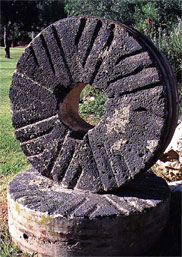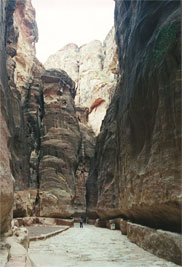Chapter Six – The Church Christ Heads!
Next Part You Must Understand!
Back to Saturday or Sunday
Back to By David C. Pack
Mark 1:1 begins with “The beginning of the gospel of Jesus Christ.” Christ’s gospel concerned His world-ruling supernatural government—the kingdom of God—to come to this earth (it was not, and has nothing to do with being, a message about His Person). In Mk 1:15, Christ commands people to repent and believe this gospel to be saved!
In Mark 1:1-45, Mk 1:21, Jesus gathered His disciples and “they went into Capernaum; and straightway on THE SABBATH DAY He entered into the synagogue.” We earlier referenced Luke 4:16, which establishes Christ’s approach toward the Sabbath: “And, AS HIS CUSTOM WAS, He went into the synagogue on the sabbath day, and stood up for to read.”
Building His Church
Later, in Matthew 16:18, Christ made one of the most fundamental statements in the entire Bible: “I will build My church.” No matter how men interpret it, this verse speaks of a single organized Church! Christ continued, “and the gates of hell [the grave] shall not prevail against it.” He promised that His Church could never be destroyed. After His Resurrection, in A.D. 31, Christ kept His promise to build His Church. That Church is alive on Earth today!
Some additional things are important to understand. Let’s read all of Matthew 16:18-19 first for background: “And I say unto you, that you are Peter, and upon this rock I will build My church; and the gates of hell shall not prevail against it. And I will give unto you the KEYS of the kingdom of heaven: and whatsoever you shall bind on earth shall be bound in heaven: and whatsoever you shall loose on earth shall be loosed in heaven.”
In order to understand the meaning here, we must start reading from Mt 16:13. Christ asked the disciples, “Whom do men say that I the Son of Man am?”
Founded on The Rock
Peter answered, “You are the Christ, the Son of the living God” (Matt. 16:16). Then Christ responded, “You are Peter [petros, which means “little rock or pebble”], and upon this rock [petra, meaning “very great rock”] I will build My Church” (Matt. 16:18). John 1:40-42 describes Peter’s brother, Andrew, bringing him to Christ: “And when Jesus beheld him, He said, You are Simon [Peter] the son of Jona: you shall be called Cephas, which is by interpretation, A stone” (John 1:42). A stone is not a giant rock.
But Christ is!
Most people—and the Catholic Church—assume Christ meant He would build His Church on Peter. This is not what it says. Christ—not Peter—is the great “Rock” upon whom the Church is built (Deut. 32:3-4, 15, 18; 1 Cor. 10:4; Eph. 2:20; Ps. 18:2).
Matthew 16:1-28, Mt 16:13 mentions that Christ was speaking at Caesarea Philippi. It is significant that He chose this site to speak of His Church! Here is why.
This city is in the far north of Israel, about 25 miles north of Capernaum and the Sea of Galilee. Located at the foot of Mt. Hermon, it is where one of the three main branches of the Jordan River originates. It is a beautiful setting.
I have stood on the spot from which Christ delivered these words. This is what I saw—and what anyone would see: Immediately above where the river springs directly out of the base of a cliff is a massive rock outcropping that dominates the topography. Its presence towers over the landscape. None who were present when Christ spoke these words could possibly have believed He was talking about building His Church on Peter, whom He compared to a little rock. The enormous physical size of the rock looming directly over Christ’s head reinforced His message that He was building the Church on a giant Rock—HIMSELF!
Recall this proof that Jesus was the God—the ROCK—of the Old Testament: “And [Israel] did all drink the same spiritual drink: for they drank of that spiritual Rock that followed them: and that Rock was Christ” (1 Cor. 10:4). Yet, once again, theologians and religionists try to place Christ in conflict with—in opposition to—the God of the Old Testament. How absurd!

PETRA, PETROS: Christ said to Peter, “Upon this Rock [petra] I will build My church.” Located in Jordan, the enormous rock formation found in Petra (named after the same Greek word Christ used) exemplifies the meaning of Christ’s words: that He would build the Church upon Himself, “the CHIEF CORNERSTONE” (Eph. 2:20)—not on Peter, whom Christ referred to as a petros, a small stone. The millstone (above) shows the size of a stone Peter referred to as a “stumbling block.” This would be a medium-sized stone—neither a massive rock nor a small stone—the kind commonly used to build temples or to seal a tomb.
Source: Free Stock Photos
Jesus Christ was the Word—the Spokesman—who inspired the Bible to be put into print. He was telling Peter that He (Christ) was about to build the New Testament Church ON HIMSELF, lead it as its HEAD (Eph. 1:22; 4:15; 5:23; Col. 1:18; 2:19; Rev. 1:13-18), be with it always (Matt. 28:20), never leaving or forsaking it (Heb. 13:5), with the gates of hell (hade's—the grave) never prevailing against it, just as He had been the Rock of, and led, the “church in the wilderness” (Acts 7:38).
Would Never Die
The Church Christ built—God’s Church—was to continue to exist, doing His Work through the ages as a “little flock” (Luke 12:32), until the end of the age, when it would reach all nations with the good news of the kingdom of God (Matt. 24:14). This Church would be persecuted (John 15:20; 16:33), but would never die out, remaining and enduring until Christ’s Return.
Matthew 7:24 instructs Christians to build their “houses” on a rock (Greek: petra). No one would suggest that a house could be built on a small stone or pebble. This alone eliminates the Church being built on Peter. He was not the first pope, given the “keys” authorizing him to change Scripture at will—including which day is the Christian Sabbath! Grasp this! Jesus was not appointing the future apostle Peter and his successors to head the Church as Christ’s earthly replacement (as a Vicar: “in place of”)!
In Matthew 16:19, Christ stated, “And I will give unto you the keys of the kingdom of heaven ...” The “keys” He is referring to is symbolic language meaning that He gives His ministers the knowledge of how to enter the kingdom of God. This knowledge shows the way of life a Christian must follow in order to achieve salvation. Luke 11:52 shows Christ reproving certain lawyers for hiding or suppressing this knowledge, thus preventing themselves and others from entering the kingdom.
Next Part You Must Understand!
Back to Saturday or Sunday
Back to By David C. Pack


